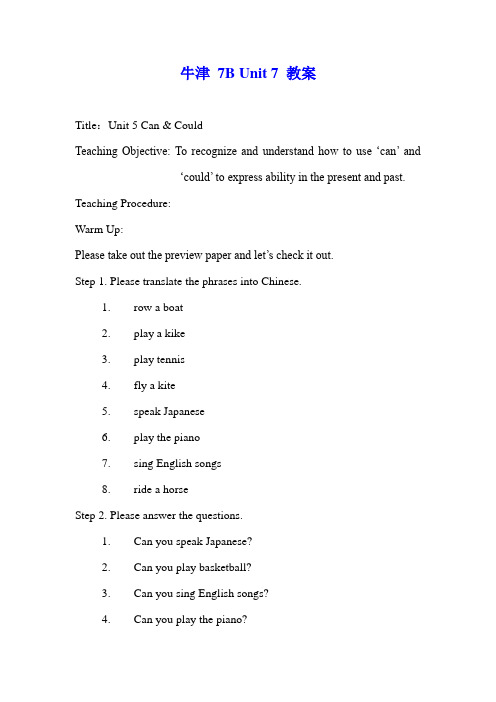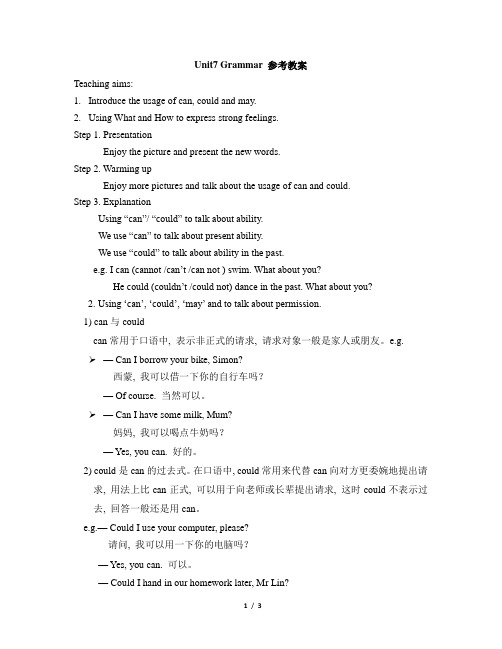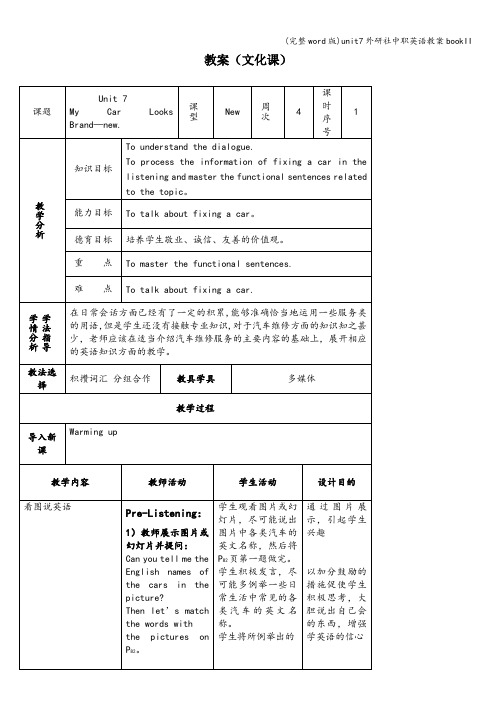unit7语法教案Word文档
- 格式:doc
- 大小:64.00 KB
- 文档页数:5


江苏省灌南县实验中学七年级英语上册《Unit7 shopping Grammar》教案牛津版一、教学目标:1. To use correct prepositions to talk about time, days months and seasons2. To recognize and use adverbs of frequency: always, usually, often, sometimes,seldom, never.二、教学重难点:How to use prepositions to talk about time and adverbs of frequency三、教学过程:Step 1 Making a revisionRevision 1. (Show different pictures of festivals to students.) Ask: What festivali s it? What do you usually do?Revision 2. Ask: How many days are there in a week? What are they? What day is the first day of the week? What day comes after Tuesday?… (Ask one studentsto write the d ays of the week on the Bb.)Revision 3. Ask: How many months are there in a year? What are they? Which is the last month? Which month comes before S eptember?… (Choose two studentsto write the months of the year on the Bb.)Step 2 PresentingAsk: When is Christmas? (It’s on Decembe r 25th.) Is it cold at Christmas? Why? (Yes. Because it is in winter.) Winter is o ne of the seasons of the year. There are 4 seasons in a year. They are spring, summer, autumn and winter. Which is the hottest/coldest season? Which season comes after spring/ summer/ autumn/ winter? Which is your favourite season? Why?Ask: What season is Halloween in? When is Halloween? What do you do at Halloween? Write the answers on the Bb. ‘Halloween is in autumn’. ‘Halloween is on October 31st.’We play a game called ‘trick or treat’ at Halloween. Underline the prepositions ‘in’, ‘on’ and ‘at’.Step 3 Practicing1. Ask some students to make similar sentences abou t themselves using these prepositions.2. Then elicit the rules for using these prepositions.3. Go through the table on page 41 with the class. Ask students to add more sentences to the ‘Example’ column.4. Ask students to complete Part A1, on their own. In pairs, ask students to check their answers. (1. on 2. on 3. at, in, on 4. in5. in)5. Ask students to look at Millie’s letter. In pairs, students read the letter together. Ask students to guess the correct prepositions for the blanks and write them in by looking at the rules on page 41. Go through the answers with the class orally.(1. on 2. at 3. in 4. at 5. on 6. in 7. on 8. on)Step 4 SummaryAsk students to say the rules for using the prepositions of time.Step 5 FrequencyWork in pairs to talk about their daily life by using adverbs of frequency.A: How often do you …?B: I always / usually / often / sometimes / seldom / never ….·Students are always intereste d in the life of their teacher. Tell them how often you do certain things, e.g.,I always walk to school.I n ever drive.I sometimes eat lunch in a restaurant.I often eat fruit and salad at lunchtime.Ask the students to say something about themselves or their partners by imitating what you have said.·Ask students to write out their diets on a piece of paper.·Then in pairs, students ask their partners about these foods, using the structure How often do you eat…?·Students compare their eating habits with their partners’. Ask for a few volunteers to report their results to the class.Step 6: Making a summaryT: In this period, we’ve learned how to use adverbs of frequency. Pay attention to their differences and their positions in sentences, e.g. I always get up at six in the morning. I am always happy.Step 7: Doing homeworkOral work: Revise this periodWritten work: Teachers can assign this part according to their own conditions.教学反思:送相关资料考试答题的技巧拿到试卷之后,可以总体上浏览一下,根据以前积累的考试经验,大致估计一下试卷中每部分应该分配的时间。

牛津7B Unit 7 教案Title:Unit 5 Can & CouldTeaching Objective: To recognize and understand how to use ‘can’ and‘could’ to express ability in the present and past. Teaching Procedure:Warm Up:Please take out the preview paper and let’s check it out.Step 1. Please translate the phrases into Chinese.1. row a boat2. play a kike3. play tennis4. fly a kite5. speak Japanese6. play the piano7. sing English songs8. ride a horseStep 2. Please answer the questions.1. Can you speak Japanese?2. Can you play basketball?3. Can you sing English songs?4. Can you play the piano?5. Can you fly a kite?6. Can you ride a horse?7. Can you run fast?8. Can you cook?Step 3.Please read out the reports about the sports your classmates couldn’t do last year but can do this year.Presentation:Step 1.We have learn ‘can’ before and know how to use it to ex press abilities. Well, let’s review the sentence styles in which ‘can’ isused.陈述句:sb./sth.+can+doe.g. He can dance.Millie can swim.We can sing English songs.否定句:sb./sth.+cannot/can’t +doe.g. He cannot/can’t dance.Millie cannot/can’t swim.We cannot/can’t sing English songs.一般疑问句:Can sb./sth. do?e.g. Can he dance?---Yes, he can./No, he cannot/can’t.Can Millie swim?---Yes, she can./No, she cannot/can’t.Can we sing English songs?---Yes, we can./No, wecannot/can’t.Step 2. Now, we know how to use can to express abilities now, but howto express abilities in the past. Generally speaking,we just change ‘can’ into ‘could’.Tip: can-could, cannot/can’t-couldn’t/could note.g. He could dance.We couldn’t /coul d not sing English songs.Could Millie swim?---Yes, she could./No, she couldn’t. Step 3. We have know how to use both ‘can’ and ‘could’ now. Let’s finish the work on the book. And then let’s check it out.Step 4. Do and check out the review paper.Assignments:1. Finish the preview paper.2. Review what have been learned.。

Unit7 Grammar 参考教案Teaching aims:1.Introduce the usage of can, could and may.ing What and How to express strong feelings.Step 1. PresentationEnjoy the picture and present the new words.Step 2. Warming upEnjoy more pictures and talk about the usage of can and could.Step 3. ExplanationUsing “can”/ “could” to talk about ability.We use “can” to talk about present ability.We use “could” to talk about ability in the past.e.g. I can (cannot /can‟t /can not ) swim. What about you?He could (couldn‟t /could not) dance in the past. What about you?2. Using …can‟, …could‟, …may‟ and to talk about permission.1) can与couldcan常用于口语中, 表示非正式的请求, 请求对象一般是家人或朋友。
e.g.— Can I borrow your bike, Simon?西蒙, 我可以借一下你的自行车吗?— Of course. 当然可以。
— Can I have some milk, Mum?妈妈, 我可以喝点牛奶吗?— Yes, you can. 好的。
2) could是can的过去式。
在口语中, could常用来代替can向对方更委婉地提出请求, 用法上比can正式, 可以用于向老师或长辈提出请求, 这时could不表示过去, 回答一般还是用can。


初中语法第七课教案1. 知识目标(1)能够正确运用一般现在时描述经常性和习惯性的动作、状态和特征。
(2)能够正确运用一般现在时的疑问句和否定句。
(3)掌握一般现在时的be动词、行为动词和规则变化动词的用法。
(4)了解一般现在时的特殊句式结构。
2. 能力目标(1)能够熟练运用一般现在时进行日常交流。
(2)能够正确运用一般现在时进行句子仿写和作文创作。
3. 情感目标激发学生学习英语的兴趣,培养积极的学习态度,提高自主学习能力。
二、教学重难点1. 教学重点(1)一般现在时的基本结构和用法。
(2)一般现在时的疑问句和否定句的构成。
(3)一般现在时的特殊句式结构。
2. 教学难点(1)一般现在时的特殊句式结构。
(2)行为动词的用法。
三、教学步骤1. 导入新课通过展示图片,引导学生观察和描述图片中的人物和场景,引出一般现在时。
2. 讲解一般现在时(1)讲解一般现在时的基本结构:主语 + be动词(am/is/are)+ 表语;主语 + 行为动词+ 副词/介词短语。
(2)讲解一般现在时的疑问句和否定句的构成。
疑问句:be动词/行为动词 + 主语 + 其它?否定句:主语 + be动词/行为动词 + not + 其它。
(3)讲解一般现在时的特殊句式结构:there be句型和have/has got句型。
3. 举例讲解通过例句和练习,让学生掌握一般现在时的用法,注意区分行为动词和状态动词。
4. 课堂练习(1)完成练习册上的相关练习题。
(2)小组内进行角色扮演,运用一般现在时进行对话。
5. 总结和作业布置(1)对本节课的内容进行总结,强调一般现在时的用法和特殊句式结构。
(2)布置作业:运用一般现在时写一篇小作文,描述自己和家人的日常活动和特点。
四、教学反思本节课通过图片导入、讲解、练习和总结等环节,让学生掌握了一般现在时的基本用法。
在教学过程中,注意引导学生观察、思考和运用,提高了学生的学习兴趣和积极性。
同时,通过小组活动,培养了学生的合作意识,提高了口语表达能力。
教学目标:1. 知识目标:使学生掌握名词所有格的构成方法和用法。
2. 能力目标:培养学生运用名词所有格的能力,提高学生的语言表达能力。
3. 情感目标:激发学生对语法学习的兴趣,培养学生的团队协作精神。
教学重点:1. 名词所有格的构成方法。
2. 名词所有格的用法。
教学难点:1. 名词所有格的构成方法。
2. 名词所有格的用法。
教学过程:一、导入1. 教师展示一张图片,引导学生观察并说出图片中的物品。
2. 教师提问:这些物品是谁的?引导学生思考名词所有格的用法。
二、新课讲授1. 教师讲解名词所有格的构成方法:a. 名词后加's构成:如:John's book(约翰的书)b. 名词后加's或撇号构成:如:the teacher's book(老师的书)c. 名词后加撇号加姓氏的第一个字母构成:如:the school's flag(学校的旗帜)2. 教师讲解名词所有格的用法:a. 表示某人的所有物:如:This is my mother's car.(这是我的妈妈的汽车。
)b. 表示某物的所有者:如:The book on the table is hers.(桌子上的书是她的。
)c. 表示两个或多个共有的东西:如:The children's books are on the shelf.(孩子们的书籍在书架上。
)三、课堂练习1. 教师给出一些句子,让学生判断句子中的名词是否使用所有格,并改正错误的句子。
2. 教师给出一些句子,让学生用名词所有格改写句子。
四、课堂小结1. 教师总结本节课所学内容,强调名词所有格的构成方法和用法。
2. 学生复述本节课所学内容,巩固所学知识。
五、作业布置1. 完成课后练习题。
2. 用名词所有格造句,并互相检查。
教学反思:1. 本节课通过图片、句子等多种方式,激发了学生的学习兴趣,提高了学生的学习效果。
2. 在讲解名词所有格的构成方法和用法时,注重了实际运用,使学生能够更好地掌握名词所有格。
Teaching Plan 龙华中学黄艳珍
Learning Plan of Unit7
一.The simple past tense(用法)
We use the simple past tense to talk about things that happened or did not happen in the past.
我们用一般过去时谈论过去发生或者没有发生的事情,常与表示过去的时间状语连用。
e.g Capenters sang the song "Yesterday once more" in 2007.
1.Choose the time expressions that can't be used in the simple past tense(选择不能用于一般过去时的时间状语)
today , yesterday afternoon ,when I was young, last week, every year, just now, now, three days ago, in 1980,every day
2.The basic structure of (基本结构)The Simple Past Tense:(be)
肯定句:
否定句:
一般疑问句:
特殊疑问句:
Practice Now!
(1.)He (be) busy yesterday.
(2.)She (be not )at home last night.
(3.)They (be not) Grade 7 last year.
(4.)(be) they excited just now?
(5.)Where (be) you born?
3.The basic structure(基本结构)of The Simple Past Tense(行为动词)
肯定句:
否定句:
一般疑问句:
特殊疑问句:
Practice Now!
(1)He (go) to Beijing three days ago.
(2)We (not paly) tennis last Sunday.
(3)you (watch) a movie the day before yesterday?
(4)Who you (talk) to just now?
4.How to add “ed" to regular verbs(规则动词)
(1)大多数动词,直接加—ed,如attend—attended call--called
(2)以-e结尾的,在动词后面加-d,如,like—liked,move--moved
(3)以辅音字母+y结尾的,“y”改为“i”,再加-ed,如,study—studied cry--cried
注意:enjoy—enjoyed play---played
(4)以一个短元音+一个辅音字母结尾的重读闭音节,应双写最后的辅音字母再加-ed
如,stop—stopped plan—planned
Work out the rule: For most verbs, we add to form the simple past tense.
5.不规则的动词的过去时,要熟记。
(p123)
二. Consolidation(巩固练习)
(1).写出下列动词的过去式。
1.am--
2.have/has--
3.go--
4.take--7.do--
8.see-- 9.buy-- 10.dance- 11.put-- 12.build--
13. enjoy-- 14.make-- 15.study-- 16.get-- 17.carry--
18.tell--
(2).Discussion: What did you do yesterday/last night/last Sunday..?(Make a conversation in your groups.)
三.More practice
A
Last month, Tony 1 (have)a very busy weekend. 2 Saturday morning,he3 (clean) his room. In the afternoon, he did his homework.It4 (be)very easy ,so it took only half5 hour. In the evening, he visited 6 (he)friends,7 he had a good supper that evening .On Sunday morning, he 8 (get)up very late. Then he9 (read) a book about Chinese history. In the afternoon, he went to 10 (see)an interesting movie.
B
Jay 1 _____ (go) to the Clubs Fair last weekend. There 2_____ (be) many clubs there. He 3 _____ (choose ) the English Club. There are many 4 ______ (student) in the English Club. They 5_____ (meet) at 4 o’clock every Friday afternoon in Room 302. They talk about how to learn English well 6 how to speak English well. Jay thinks English is a very difficult subject. But Jay likes 7 _____ English club very much. He 8___ _ (think) he can learn 9 ______ lot in the club. He hopes he can be good at 10 _____ (learn) English in the future.
四.Homework:
(一)选择正确答案。
1. -- What did they do last weekend? -- They _________ to the park.
A. went
B. go
C. gone
2. -- How ____ your weekend? -- Not too bad. I stayed home and watched TV.
A. was
B. were
C. is
3. What did you do ____ last weekend? A. in B. / C. for
4. I _____ English yesterday evening. A. study B. studied C. studyed
5. Did he ____ to sleep late last night? A. went B. go C. goes
6. My father _____ ill yesterday. A. isn't B. aren't C. wasn't
7. _____ your parents at home last week? A. Is B. Were C. Are
8. The twins ______ in Dalian last year. They ______ here now.
A. are; were
B. were; are
C. was; are
(二)改写句子
1. Lucy did her homework at home. (否定句)
Lucy _______ _____ her homework at home.
2. He found some meat in the fridge. (一般疑问句)
______ he _____ ______ meat in the fridge?
3. She stayed there for a week. (划线部分提问)
_____ _____ ____ she _____ there?
4. There was some orange juice in the cup. (一般疑问句)
_____ there _____ orange juice in the cup?。